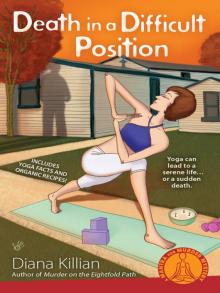- Home
- Diana Killian
Sonnet of the Sphinx Page 19
Sonnet of the Sphinx Read online
Page 19
Well, as they used to say back home, the best defense was a good offense. She knew what most people would think about such a stunt—she knew whatshe would ordinarily think—but she still believed she was justified in investigating Sartyn. Her house and car had been casualties in a secret war against her. The police believed she was involved in Kayaci’s murder. She must go on the offensive, not only to clear her name but to protect herself.
Scott Sartyn had to be behind the attacks. He had made no secret of his unprovoked dislike of her; he had deliberately tried to throw suspicion on her. He had known Kayaci; he had been in Turkey. He had been in the park the night Kayaci was murdered—only a few yards away when Grace had discovered the body.
Well, perhaps that was circumstantial; and besides, Grace believed that it was most likely Peter who had been driven to kill Kayaci, but Sartyn was involved somehow. It was Sartyn who posed a threat to her, of that she was sure. And that was why, while Peter believed she was visiting Sally Smithwick, Grace had been sitting in her car half the night watching Scott Sartyn. She had been watching him every spare minute since the fire at the Gardener’s Cottage, but so far there had not been much to see. Aside from spending—according to local gossip—as much as a Yank on hygiene products, he seemed to lead a blameless life.
Following as far back as she safely could without losing sight of the taillights ahead, the Citroën sputtered along behind the sedan as it wound through the narrow side streets. Grace kept her headlights off. It was risky, but she knew the roads well, and at that time of night they were deserted except for her and her quarry.
Within a minute or two, she suspected she knew where Sartyn was headed. She was unsurprised when he turned in and parked before the tall iron gates of the Monkton Estate.
Grace pulled beneath the spreading trees and killed her engine.
She watched Sartyn get out, unlock the gates, and slip through them. He made his way across the overgrown lawn and disappeared behind the back of the house.
She gave him several long minutes, started the car, and, lights still out, drove past the tall gates, rolling to a stop, tires crunching on gravel a few yards down from the house.
She got out, closing the car door stealthily, and tiptoed up to the gates. They squeaked rustily as she opened them wide enough to squeeze through, and for a moment she froze, eyes pinned on the silent house.
Nothing moved.
Grace darted across the lawn, keeping to the shadows of the ancient trees. The night air was warm and humid. The breeze that stirred the branches felt like a hot breath on the back of her neck.
There was no sign of Sartyn.
Reaching the house, Grace skirted along the terrace till she came to an elegant swirl of brick steps. At the far end of the terrace, past the empty stone urns and gently banging shutters, she could see an open window.
Softly, softly she ran on the balls of her feet across the bricks and cautiously peered through the open window.
A leaf skittered behind her on the terrace and she turned, startled, but saw nothing but moonlight and shadows. Her nerves were getting the best of her.
A sound from inside the house caught her attention, and once more she peered inside.
She was looking into a small downstairs bedroom, probably in the servant’s quarters. The room was empty except for a narrow brass bed without a mattress. She could barely make out an open door and a dark hallway beyond.
She could hear footsteps moving off down the hallway. Brisk, confident footsteps.
Sartyn had been there before, that was evident. Often enough that he was not concerned with concealing his activities.
Grace sat on the sill and dropped down into the room. Crouching, she waited a moment or two.
She rose, went into the hall, and switched on her flashlight. Nothing happened. She shook it. A set of stairs appeared in the wan light, running upstairs from the left. To the right, the hall turned a corner and disappeared who knew where.
Which way?
She listened intently. The footsteps seemed to be coming from the left.
Sneaking along the hall, she tiptoed up the stairs. This was the kitchen. Grace made her way through the cutting tables and old-fashioned appliances.
Ahead of her, the footsteps had stopped.
She snapped out the light and held her breath, listening.
A floorboard creaked. The sound seemed to come from the hallway behind her. Whirling, she stared, but she could see nothing.
The old house settling, she told herself.
From somewhere above, she could hear a muffled tapping. It sounded like bad plumbing. The sound seemed to travel down the length of the room.
Now, what was that about?
She turned the flashlight back on and crept softly down the next hallway. At the far end she could see a light shining.
Sticking to the wall, she edged along toward the light. When she reached the doorframe, she paused, gathered herself, then peeked around the corner.
The long, narrow dining room was empty of furniture. An elegant fireplace dominated one wall. A huge chandelier sparkled overhead. Even with the heavy draperies drawn, this seemed brazen to Grace.
She could still hear the rapping coming from the room beyond the dining room. What was he doing? Hammering something?
Grace steeled herself to cross the brightly lit room.
As she reached the doorway, the knocking ceased. Grace stopped short. A long, dark shadow slid across the polished floor.
She heard a queer sound, like a strangled cough. A moment later, the light went out in the room ahead of her.
Grace hesitated. The light from the chandelier cast flickers of blue and green and yellow against the rich wood paneling.
Beyond was silence. Dark.
A strange, unreasoning terror swept over her. Stepping back against the wall, she flicked off the light switch. The room plunged into darkness. Grace stood motionless, trying to control her breathing.
Her flashlight formed a small spotlight on the floor beside her and she turned it off, too.
She could not identify the sounds in the room ahead of her, but atavistic instinct warned her that something horrible had happened.
She began to edge backward the way she had come.
The floor squeaked loudly a few feet ahead of her.
Grace switched on the flashlight.
Caught in the circle of light was a nightmarish figure—black and bulky, and advancing with one arm poised to strike. A ski mask covered the face and hair, something sharp glittered in the light.
Grace squealed and threw her flashlight at her attacker.
The light cast macabre shadows as it tumbled through the air, missing its target. Something brushed past her face, and bright pain lanced down Grace’s shoulder and back.
She turned to run and smacked into a wall.
Half-dazed, she crouched. The beam of her fallen flashlight illuminated a pair of stout black walking shoes. The shoes did not move.
Grace held perfectly still, not daring to breathe, not daring to swallow. Her eyes never wavered from the pair of black brogues in the spotlight.
Black brogues and charcoal trouser cuffs above them, still as a statue.
And then the flashlight moved. The beam swung up and across the opposite wall. He had picked up the flashlight. What could she do? If she moved, he would hear—and see—her. If she stayed where she was, he would find her in a moment.
The flashlight dimmed and went out.
She heard him shake it. The light flickered on the chandelier, then nothing. There was a bang across from her, and Grace nearly screamed. He must have thrown the flashlight.
She bit her lip to keep hysterical laughter from bubbling out. She didn’t dare so much as exhale.
He was listening for her. Listening for which way she had run. Could he sense her presence? Feel the heat and panic emanating from her tense body?
After what felt like a lifetime, the floorboards creaked.
T
he soundless, careful tread raised the hair on Grace’s scalp. She pressed her hands tight against her mouth to muffle the sound of her own breathing. Her shoulder twinged, and blood trickled down her back, itching as it went.
There was another creak by the doorway. He was leaving, retreating.
She stayed statue still. Seconds passed. She couldn’t trust her senses. Was the whisper of sound from down the hall or in her imagination?
She tried to think. He must have followed her in. He could still be waiting for her, in the servant’s room or outside on the terrace…or in the backseat of her car.
She trembled.
She was afraid to move, but she had to get out of that house.
And she needed to know for sure what had happened to Scott Sartyn.
Or was Sartyn the man who had tried—no, no. Sartyn had been wearing khakis and a dark shirt.
Her shoulder and arm throbbed. She felt with her good hand. Her shirt was torn; she could feel the long gash down her upper arm. It was bleeding a lot, although any blood seemed like a lot when it was your own.
Still she waited, ears alert for any sound. Her legs began to cramp. She couldn’t stay there all night. Sartyn’s car was parked outside the gates; it might draw attention. The police might show up—not that she wouldn’t prefer the police to whatever might be waiting for her in the maze of hallways and staircases beyond.
She could hear her wristwatch ticking.
At last, cautiously, she crawled across to where she thought she had heard her flashlight fall. Her hand closed around its smooth barrel with relief. As weapons went, it wasn’t much, but it was all she had.
She shook it hard, flicked it off and on. Watery light pinpointed the entrance to the next room.
Her heart pounding in sickening thuds, she crossed the long room and stepped through the doorway.
The fading light picked out the figure crumpled on the floor before the immense fireplace.
Blood pooled on the polished floor behind Scott Sartyn’s head. His eyes were fixed in terror.
24
“What the hell were you thinking?”
“I just wanted to know what he was up to.”
“Jesus.”
“Ouch!” She flinched as Peter, taping her shoulder up with remarkable efficiency, pressed too tightly on the puncture through the meaty part of her upper arm.
Grace was so exhausted she could barely think straight. Her panicked escape from the house and the seemingly endless drive back to Peter’s was a blur. The whole evening was a blur.
“I could bloody well murder you myself.” He finished bandaging her shoulder and stepped back, running both hands through his hair as though he had to do something with his hands or throttle her.
The bright light bouncing off the gleaming porcelain and brass fixtures was not kind to him: pale hair ruffled, blue smudges beneath his eyes, and lines carved from his mouth to his nose that she didn’t remember seeing before. He looked as though he had been walking the floor half the night; and though his insomnia could hardly be laid at her door, she still felt guilty for dragging him into her problems when his position was already vulnerable.
“I’m sorry,” she said. Not least because her shoulder hurt like blazes, adding to the list of aches and pains she’d picked up over the past weeks. She moved it cautiously and winced.
“I suppose you left fingerprints everywhere?”
She nodded guiltily.
“Footprints? And tire tracks?”
She protested, “I didn’t expect him to be murdered. I was merely…observing him. As we theorized, he’s searching for something. Or rather, he was.”
Peter put a hand to his head as though he felt a headache coming on. Or possibly a stroke.
“I know what you’re thinking.”
His eyes opened wide like those of a cat dumped in a tub of ice water. “No,” he said. “You don’t. I’m not sure what I’m thinking.”
“Could you tell what he stabbed me with?”
“Do I look like a forensics expert to you?”
“I don’t think it was any kind of knife. It felt like a screwdriver.”
“Had a lot of experience being stabbed by screwdrivers?” He raked a hand through his hair. “Are you positive Sartyn is dead?”
She closed her eyes for a moment against the memory of that sight. She nodded.
“And you couldn’t see who the other was?”
“No.”
“Man or woman?”
“Man. I think.”
“Could you judge the size of his feet?”
She was tempted to retort, “Do I look like a podiatrist to you?” but managed a docile, “Big for a woman, small for a man. They looked like men’s shoes. And men’s trousers. They looked old-fashioned.”
“How tall was he?”
She closed her eyes, trying to see the murderer in her flashlight beam. “Medium. Stocky, I think.”
“How did he move?”
“Like he intended to kill me.”
“Did he move fast and loose like a kid? Did he seem to know what he was doing?”
“I don’t know.”
He stared at her for a long hard moment.
“I didn’t think it would go this way,” she said feebly.
“You didn’tthink.” But he said it absently, his eyes narrowed, focused on some inner vision. Then he shook his head as though clearing it.
“Hell. We’ve got to go back.”
“What?Why?” Nothing on earth would induce her to go back there. The thought of the creepy house and what waited within…“I can’t,” she told him. “Sartyn left his car out front. Someone may have seen it by now. The police may already have discovered the body. It’s too dangerous.”
“We’ve got to risk it. You’ve admitted you left your fingerprints everywhere.”
“My fingerprints aren’t on file—not in a police database.”
“You’ve no notion where they’re on file. Do you think the police won’t try to match fresh, unidentified prints to their prime suspects? We’ve no choice.”
The good news was that he kept saying “we.” The bad news was that he kept insisting they had to go back. “What if the murderer comes back? What if he’s waiting for us?”
But Peter was already out of the bathroom. She could hear him opening drawers, closing them, footsteps moving swiftly back and forth. Grace rose and splashed cold water on her face.
He was back in a moment, and Grace was startled to see that he had changed into black jeans, black turtleneck, and black canvas shoes.
He tossed her a pair of black gloves.
They made the drive back to the Monkton Estate in record time, Peter cruising slowly past the front of the house where Sartyn’s car still stood outside the gates.
“It doesn’t look like anyone has been here,” Grace said uneasily.
“Where did you park?”
She pointed out the spot as he drove on down the lane. They bumped over the small stone bridge, then turned off the road to cut through the woods. At last Peter brought them up on the back of the estate, pulling to a halt behind the tall iron fence.
Grace got out of the Land Rover, staring doubtfully at the tangled garden beyond the tall fence—and farther on, the black windows of the house.
“I’ve got a bad feeling about this,” she murmured.
“It’s called fear. You’ll get over it.” He beckoned to Grace, who shinnied with more haste than grace up a tree whose fallen limbs made a rough ladder over the fence. Her injured arm hurt like blazes. Her hand, injured in the fire, throbbed. All in all, she was not having a good night.
Perched in the tree, she stared down at the spear-points of the iron fence, so perfect for impaling oneself.
Peter swung up beside her. “All right?”
She nodded jerkily.
He lowered himself lightly to the grass and gestured to Grace to jump down. She took a deep breath and dropped down in the grass. As a result her shinsand her shoulde
r hurt. She really needed to work out more if she was going to make a habit of this kind of thing.
She started forward, but Peter caught her arm, scanning the neat rows of windows for any sign of life.
“Do you see anything?”
He shook his head, gesturing for her to follow him.
They made their way through the garden, narrow paths covered in dead leaves, wildflowers and weeds springing through the dead vines and scummy ponds. They passed a reflective pool with a bronze statue of an ibis standing at the murky water’s edge.
At last they came to the terrace.
Peter said, undervoiced, “We’re going to retrace your footsteps exactly. Point out to me any place where you think you touched.”
She nodded. He motioned for her to take the lead.
She went up the stairs, pointing to where she had touched the balustrade. Or at least where she thought she had touched it.
Peter wiped down every place she motioned to. They crossed the terrace and slipped inside the house through the still-open window, Grace trying to repeat every motion she had made before. Peter wiped each place she touched, sill, doorframe, wall.
They made their way through the passages leading from the servants’ quarters, up through the kitchen, and into the other hallway. She glanced over her shoulder. Peter was so quiet, his motions so economical, she would not have been surprised to find herself alone in the echoing emptiness of the corridor.
If he had not been with her, nothing on earth would have persuaded Grace to return to that creepy mausoleum of a house. As it was, she hoped they were not walking into some kind of a trap.
They crossed the dining room and entered the main hall. Grace shuddered. She could see the black outline of Sartyn sprawled on the floor where he had fallen.
Peter’s flashlight beam moved over the body.
“It sounded like he was tapping the walls,” Grace whispered. “Probably trying to sound out a hidden room or hidey-hole.”
Busily going through Sartyn’s pockets, Peter didn’t seem to hear her.
“What are you doing?”
“Looking for spare change.” He cast her a quick exasperated look. Finding Sartyn’s keys, he tossed them once and caught them, an unexpectedly jaunty action.

 High Rhymes and Misdemeanors
High Rhymes and Misdemeanors Corpse Pose
Corpse Pose Verse of the Vampyre
Verse of the Vampyre Sonnet of the Sphinx
Sonnet of the Sphinx Docketful of Poesy
Docketful of Poesy Death in a Difficult Position
Death in a Difficult Position Dial Om for Murder
Dial Om for Murder Murder on the Eightfold Path
Murder on the Eightfold Path